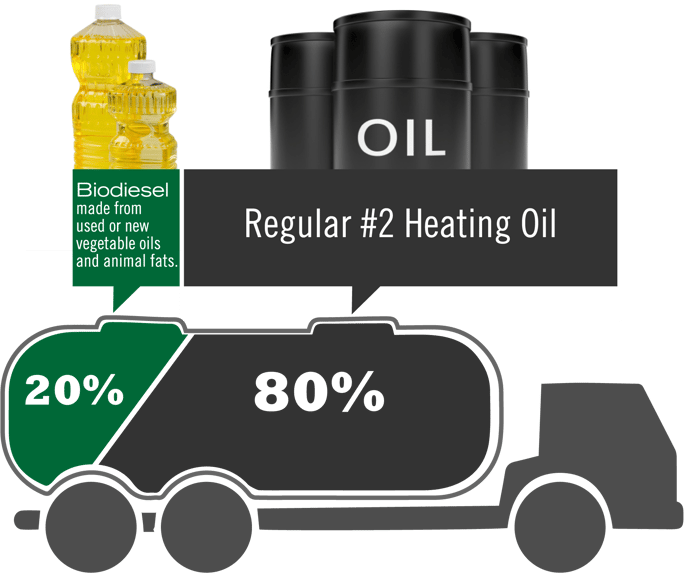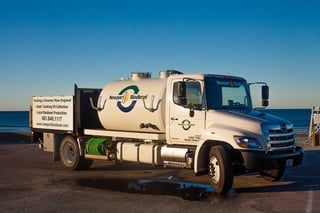We’ve come a long way in understanding the best practices for using biodiesel in our home heating system. Unlike biodiesel used in cars, home biodiesel does not require any do-it-yourself retrofitting for safe use. By reading this blog we hope you can get a better understanding of the benefits of biodiesel and the steps you can take to begin using bio-heat in your home heating oil system!
Are you a visual learner? Check out our recent webinar “Why you can start heating with biodiesel today” to see images, infographics and more!
What is Biodiesel?
This ratio of 20% biodiesel to 80% regular heating oil can be used in your current heating oil system. No modification needed!
Heating oil that contains biodiesel can be referred to as “biodiesel” or “bio-heat.” So what is biodiesel? Essentially biodiesel is a type fuel made from vegetable oils or animal fats. These oils or fats can be harvested from crops like canola or soybeans or it can be made from used oils from restaurants and homes. Biodiesel is most commonly sold as a blend that is made up of 20% biodiesel and 80% regular heating oil, commonly referred to as the B-20 Biodiesel blend. This ratio of 20% biodiesel to 80% regular heating oil can be used in your current heating oil system. No modification needed! The American Society for Testing and Materials (ASTM) ensures that such a biodiesel blend can be used in any heating system.

You might be wondering why we don’t just use 100% vegetable oil to heat our homes. Believe it or not that’s not such a far-fetched idea. However there's a reason why the recommended ratio is 20 to 80 percent. Biodiesel is a solvent, which is what makes it burn cleaner than regular heating oil, however in high concentrations it has been known to degrade the rubber seal on fuel pumps for oil burners or furnaces. Of course, a service technician can simply come and replace the seal.
However, most dealers want to ensure certain quality standards. Research and time have proven that B-20 biodiesel has no detrimental impact on heating systems and allows for a smooth transition into cleaner heating oil.
Life Cycle Emissions
As you know, energy is used throughout the entire production process of any service or product, and biodiesel is no different. Lifecycle emissions refer to the total pollution generated in the production, transport, storage and use of a product. For biodiesel fuel, lifecycle emissions include the pollution created from growing and harvesting crops for biofuels. That is why biodiesel fuel made from used waste grease (used animal fats and vegetable oils) is what we recommend.
Biodiesel Burns Cleaner and Saves You Money on Service Costs
Apart from the fact that lifecycle emissions are significantly lower for biodiesel made from used waste grease, when burned biodiesel also releases less harmful byproducts like nitrogen oxide, hydrocarbon and particulate emissions into the atmosphere. This means there are fewer toxins that contribute to toxic smog, acid rain, and the break down the earth’s ozone.
Plus, there is another “clean” perk: because biodiesel is a solvent, the act of using biodiesel actually helps to break down any naturally occurring sludge or particulate build-up in your oil heat systems. This means biodiesel users can actually expect lower maintenance costs over time.
Do I have to Modify My System to Use Bio Heat?
Folks who are interested in heating with biodiesel often wonder whether they need to make any modifications to their heating system prior to taking their first delivery. The answer is simple….no! However, if you have an older heating system, or your oil storage tanks are outdoors, there are two important considerations you should know prior to heating with biodiesel:
- Older Heating Systems: If you have an older heating system you’re likely to have a decent amount of sludge or build up inside of your tank. Like we mentioned earlier, biodiesel is a solvent, so it will likely start to break down some of the sludge that has built up in your tank over time. Once that sludge gets loosened it can then clog the oil filter. This is one of the more common bumps in the road that people face when they take their first delivery of biodiesel. Fortunately, this can be easily prevented or remedied. If you do have an older system we recommend that you clean your furnace or boiler before you take your first delivery of biodiesel. And if your filter does get clogged after you accept your first delivery, simply replace the filter.
- Outdoor Oil Tanks: The second possible problem is less likely for New Englanders, although definitely worth noting. Unlike regular heating oil which stops flowing around -11 degrees Fahrenheit, biodiesel has a higher temperature at which it stops being able to flow properly to heat your home. Fortunately, because we live in the Northeast, it is unlikely that you will have this problem as your oil tank is most-likely already being housed indoors.
Where Can I Buy Biodiesel?
Bio-Heat is an option under our Discount Heating Oil Service (with People’s Power & Light in RI and Mass Energy in MA). In other words, if you are a member or if you become a member of our Discount Heating Oil Service, you can indicate on your application that you prefer bioheat.
Our Bio-heat Service:
 In the same way that our Discount Heating Oil Service negotiates prices on regular heating oil, we have negotiated a discounted price per gallon on our biodiesel blend. The price per gallon our members will pay for biodiesel will be about 15 cents below the statewide average price for full-service heating oil dealers. Although the price is about 10 to 15 cents higher than our regular heating oil price, the benefits to the environment and your heating system make up for it—and you’re still getting a discount.
In the same way that our Discount Heating Oil Service negotiates prices on regular heating oil, we have negotiated a discounted price per gallon on our biodiesel blend. The price per gallon our members will pay for biodiesel will be about 15 cents below the statewide average price for full-service heating oil dealers. Although the price is about 10 to 15 cents higher than our regular heating oil price, the benefits to the environment and your heating system make up for it—and you’re still getting a discount.
Here are a few things to keep in mind before signing up:
- In most delivery areas our Bio-Heat dealer offers optional service but does not offer annual service contracts.
- Our Bio-Heat program is only available to customers on automatic delivery.
- Biodiesel can be more expensive than regular heating oil, but the benefits of heating with biodiesel more than outweigh the cost. It’s a cleaner fuel that is better for your heating system (saving you money in service) and the environment.
- Our Bio-heat supplier delivers to the entire state of Rhode Island and parts of Southern Massachusetts. If you live in Massachusetts, click here to see if they make deliveries to your area.


 In the same way that our Discount Heating Oil Service negotiates prices on regular heating oil, we have negotiated a discounted price per gallon on our biodiesel blend. The price per gallon our members will pay for biodiesel will be about 15 cents below the statewide average price for full-service heating oil dealers. Although the price is about 10 to 15 cents higher than our regular heating oil price, the benefits to the environment and your heating system make up for it—and you’re still getting a discount.
In the same way that our Discount Heating Oil Service negotiates prices on regular heating oil, we have negotiated a discounted price per gallon on our biodiesel blend. The price per gallon our members will pay for biodiesel will be about 15 cents below the statewide average price for full-service heating oil dealers. Although the price is about 10 to 15 cents higher than our regular heating oil price, the benefits to the environment and your heating system make up for it—and you’re still getting a discount.
Comments